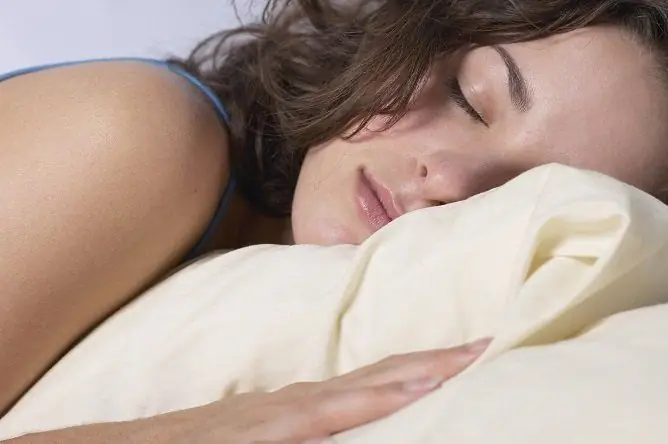- Author Rachel Wainwright wainwright@abchealthonline.com.
- Public 2024-01-15 19:51.
- Last modified 2025-11-02 20:14.
Sleep hormone
The content of the article:
- Where is it produced
-
What is needed to develop
- Tryptophan
- Illumination
- When is it produced
-
What is responsible for
- Role in sleep regulation
- Other functions
-
How to improve performance
- Medication
- Food
- Sleep regulation in the elderly
- Video
Sleep disturbance creates a lot of problems in a person's life. Insomnia, lack of sleep, daytime sleepiness - all this is not only unpleasant, but also dangerous to health. Such disorders are usually associated with a lack of melatonin, the sleep hormone. This is the main hormone of the pineal gland, the synthesis of which is subject to daily fluctuations - it is mainly produced in the dark. You can increase its content naturally, with the help of a regimen and food. If this is ineffective, they start taking medications.

A hormone produced by the pineal gland, melatonin, is responsible for a person's sound sleep.
Where is it produced
The largest amount of melatonin is synthesized in the pineal gland - the pineal gland. The pineal gland also produces serotonin and other substances important for the body.
In the pineal gland, the hormone begins to be released in response to the reaction of the visual receptors, which signal the onset of darkness.
But the pineal gland is not the only organ that produces sleep hormone. Outside the brain, it is synthesized in the following body structures:
- gastrointestinal tract;
- kidneys and adrenal glands;
- liver, gallbladder;
- pancreas;
- Airways;
- ovaries, endometrium.
What is needed to develop
The production of melatonin in the human body depends on several factors - light, tryptophan amino acid, and the functioning of the enzymatic system.
Tryptophan
Melatonin in the body is made from tryptophan, an amino acid that is a precursor to serotonin. And serotonin, in turn, is converted into melatonin under the influence of special enzymes. If there is not enough tryptophan in the body, it can lead to trouble falling asleep.
Illumination
Hormone production is highly dependent on light levels. Bright light reduces its production. The secretion of the hormone in the pineal gland is triggered in response to a signal from the visual system about the onset of darkness. Therefore, decreasing light exposure increases melatonin levels.
When is it produced
Melatonin is a hormone that is produced at night. Changes in its concentration have a noticeable daily rhythm - the level of the hormone rises in the evening, reaches a maximum at night, and in the morning and during the day its amount in the blood is insignificant. The maximum concentration in the blood occurs on average at 2 am local time. Nighttime accounts for approximately 70% of the daily production.
What is responsible for
The main effect of melatonin is on the regulation of the sleep-wake cycle. But its influence does not end there, the action of the hormone extends to other processes in the body.
Role in sleep regulation
Melatonin is the main hormone responsible for sleep.
It participates in the creation of a circadian rhythm - it affects the cells of endocrine organs, affects the production of other hormones. In addition, it regulates blood pressure, the frequency of sleep, and reduces emotional and physical activity.
Because of such daily fluctuations, with the onset of darkness, you want to sleep. However, normal hormone production is not a guarantee of fast falling asleep. It regulates sleep, but does not induce it. It is believed that under the influence of the hormone, the so-called sleep gate opens, but it does not activate the brain structures responsible for falling asleep.
Other functions
Melatonin's role is not limited to affecting the sleep cycle and wakefulness. It has other properties as well.
| Property | Explanation |
| Influence on the endocrine system | It consists in inhibition of the synthesis of gonadotropins, somatotropin, corticotropin and thyrotropin. |
| Antioxidant activity | Melatonin is the hormone of youth and long life. It is capable of absorbing free radicals, which protects the human body from free radical damage. It prevents aging and aging of the skin. |
| Dealing with stress | Has an anti-stress effect. Under its influence, anxiety and negative emotional reactions are reduced, the activity of endocrine organs, which was disturbed during a period of stress, normalizes. |
| Immunostimulating effect | Participates in stimulating the immune system. It increases the activity of immune cells - phagocytes, lymphocytes. This prevents the development of a number of diseases (infectious, oncological). |
How to improve performance
You can increase your natural melatonin levels with a regimen. It is recommended to go to bed at the same time, and you need to sleep in a dark room, as this increases the production of the sleep hormone. You can artificially improve sleep with the help of food and medications.
Medication
Treatment for insomnia may include the use of medications containing melatonin. They are available in oral tablet form. For instance:
- Melaxen;
- Circadin;
- Melapur;
- Melarena;
- Yukalin;
- Sonnovan.
Melatonin is also available as a dietary supplement and available at sports nutrition stores. The drug in which it is contained helps to eliminate insomnia, relieves fatigue and irritability. Sleep becomes deep and calm, the work of endocrine organs is normalized, muscles relax, the central nervous system rests.

Melaxen is one of the drugs containing melatonin
You need to take pills after consulting your doctor. Usually the drug is well tolerated, but the following side effects may occur:
- From the side of the central nervous system: drowsiness, headache, unusual dreams, dizziness, impaired memory and attention, depression, irritability.
- From the digestive tract: nausea, vomiting, flatulence.
- Allergic reactions: skin rashes, itching.
It is contraindicated to use the drug during pregnancy and lactation, as well as children under 14 years of age. When taking pills, you need to pay attention to their compatibility with other medicines. For example, sedatives, antidepressants, tranquilizers, acetylsalicylic acid, beta-blockers reduce the expected effect. Alcohol intake has the same effect.
It is important to follow the recommendations for the use of the drug - 30 minutes before going to bed. If taken at the wrong time, the drug can cause many problems. For example, putting your internal clock in the wrong direction will only worsen your trouble falling asleep.
The duration of admission is determined individually. In some cases, a few days are enough to normalize sleep. If long-term use is required, be sure to take a break for a week after each month of use.
The drug is indicated not only for the treatment of insomnia, but also to facilitate adaptation when changing time zones. In this case, the tablets are taken a day before the upcoming departure, and then another 1-2 days after arrival. This will minimize the consequences of a violation of the circadian rhythm.
Food
For better sleep, you can eat foods that contain melatonin or tryptophan, its precursor. You can get rid of insomnia by adding to the diet:
| Foods high in tryptophan |
Dairy products: milk, hard cheese, cottage cheese. Poultry: chicken, turkey. Oatmeal, whole grain bread. Nuts: pine nuts, almonds, hazelnuts. |
| Foods high in melatonin |
Berries: cherry, sweet cherry. Bananas. Tomatoes, carrots, radishes. Rice, corn. |
It is recommended that you regularly include any of these foods in your evening meal.
Sleep regulation in the elderly
Melatonin deficiency often plays a key role in age-related insomnia - pineal gland activity decreases over the years. Therefore, in older people sleep often becomes superficial and restless, they have difficulty falling asleep, less often - early awakening. After waking up, a person does not feel vigorous and rested, drowsiness occurs. Therefore, it is especially important for them to adhere to the recommendations for improving the synthesis of melatonin.
Video
We offer for viewing a video on the topic of the article.

Anna Kozlova Medical journalist About the author
Education: Rostov State Medical University, specialty "General Medicine".
Found a mistake in the text? Select it and press Ctrl + Enter.






